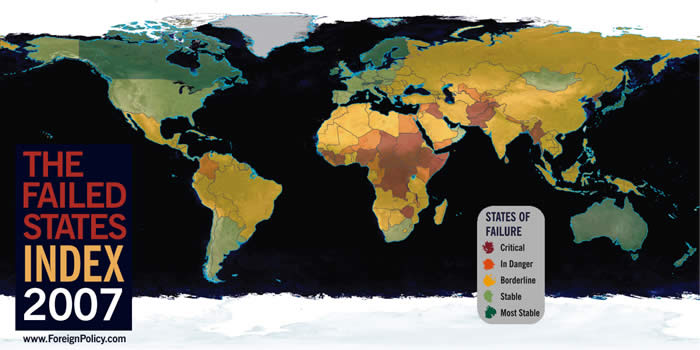
Ilankai Tamil Sangam
Association of Tamils of Sri Lanka in the USA
Published by Sangam.org
by Foreign Policy, July/August, 2007
|
The problems that plague failing states are generally all too similar: rampant corruption, predatory elites who have long monopolized power, an absence of the rule of law, and severe ethnic or religious divisions. Using 12 social, economic, political, and military indicators, we ranked 177 states in order of their vulnerability to violent internal conflict and societal deterioration. In the rankings, Rank 1 is the worst, and Rank 177 is the best. Out of the 177 countries surveyed, Sri Lanka's overall rank is 25. [Ed. Comm] |
The world’s weakest states aren’t just a danger to themselves. They can threaten the progress and stability of countries half a world away. In the third annual Failed States Index, FOREIGN POLICY and The Fund for Peace rank the countries where the risk of failure is running high.

It is an accepted axiom of the modern age that distance no longer matters. Sectarian carnage can sway stock markets on the other side of the planet. Anarchic cities that host open-air arms bazaars imperil the security of the world’s superpower. A hermit leader’s erratic behavior not only makes life miserable for the impoverished millions he rules but also upends the world’s nuclear nonproliferation regime. The threats of weak states, in other words, ripple far beyond their borders and endanger the development and security of nations that are their political and economic opposites...
What makes these alarming headlines all the more troubling is that their origins lie in weak and failing states. World leaders and the heads of multilateral institutions routinely take to lecterns to reiterate their commitment to pulling vulnerable states back from the brink, but it can be difficult to translate damage control into viable, long-term solutions that correct state weaknesses. Aid is often misspent. Reforms are too many or too few. Security needs overwhelm international peacekeepers, or chaos reigns in their absence.
The complex phenomenon of state failure may be much discussed, but it remains little understood. The problems that plague failing states are generally all too similar: rampant corruption, predatory elites who have long monopolized power, an absence of the rule of law, and severe ethnic or religious divisions. But that does not mean that the responses to their problems should be cut from the same cloth. Failing states are a diverse lot. Burma and Haiti are two of the most corrupt countries in the world, according to Transparency International, and yet Burma’s repressive junta persecutes ethnic minorities and subjects its population to forced resettlement, while Haiti is wracked by extreme poverty, lawlessness, and urban violence. For a decade, Equatorial Guinea has posted some of the highest economic growth in sub-Saharan Africa, yet its riches have padded the bank accounts of an elite few. And in the Democratic Republic of the Congo, the inability of the government to police its borders effectively or manage its vast mineral wealth has left the country dependent on foreign aid.
To provide a clearer picture of the world’s weakest states, The Fund for Peace, an independent research organization, and FOREIGN POLICY present the third annual Failed States Index. Using 12 social, economic, political, and military indicators, we ranked 177 states in order of their vulnerability to violent internal conflict and societal deterioration. The index scores are based on data from more than 12,000 publicly available sources collected from May to December 2006. The 60 most vulnerable states are listed in the rankings, and full results are available at www.ForeignPolicy.com and www.fundforpeace.org...
--------------------------------------------------------------------------------------------------
Compiled by a Sangam member:
In the rankings, Rank 1 is the worst, and Rank 177 is the best. Out of the 177 countries surveyed, Sri Lanka's overall rank was 25.
Shown below are Sri Lanka's ranks in each of the 12 categories. The Ranks below were obtained by visually counting Sri Lanka's rank, after sorting by each column.
Note that these rankings are for the entire island. If those compiling the list had focused on either the Tamils or the North East, the rankings would be considerably worse. In other words, Sri Lanka is much more a failed state for the Tamils than for the Sinhalese.
| Legacy of Vengeance-Seeking Group Grievance or Group Paranoia |
Rank 5 |
| Rise of Factionalized Elites | Rank 11 |
| Massive Movement of Refugees or Internally Displaced Persons creating Complex Humanitarian Emergencies | Rank 14 |
| Security Apparatus Operates as a "State Within a State" | Rank 18 |
| Criminalization and/or Delegitimization of the State | Rank 22 |
| Uneven Economic Development along Group Lines | Rank 41 |
| Suspension or Arbitrary Application of the Rule of Law and Widespread Violation of Human Rights |
Rank 42 |
| Chronic and Sustained Human Flight | Rank 60 |
| Mounting Demographic Pressures | Rank 73 |
| Intervention of Other States or External Political Actors | Rank 82 |
| Progressive Deterioration of Public Services | Rank 83 |
| Sharp and/or Severe Economic Decline | Rank 84 |
|
||||||||||||||||||||||||||||||||||||||||||||||||||||||||||||||||||||||||||||||||||||||||||||||||
© 1996-2025 Ilankai Tamil Sangam, USA, Inc.